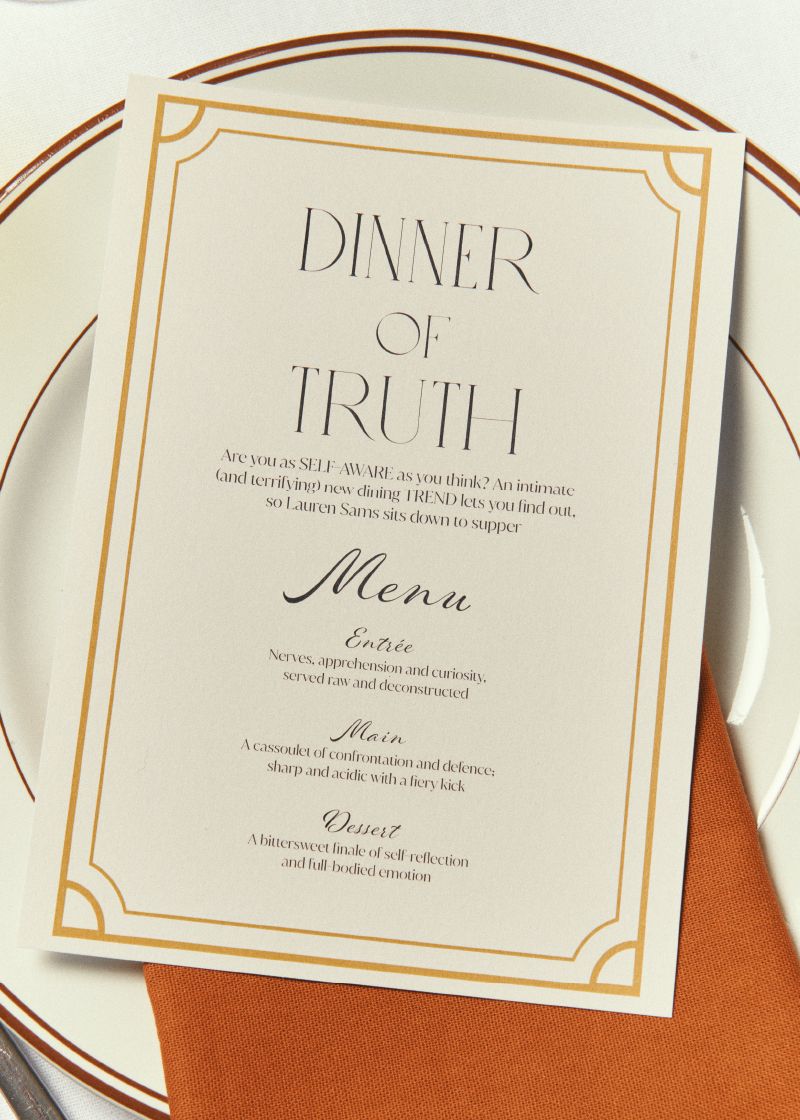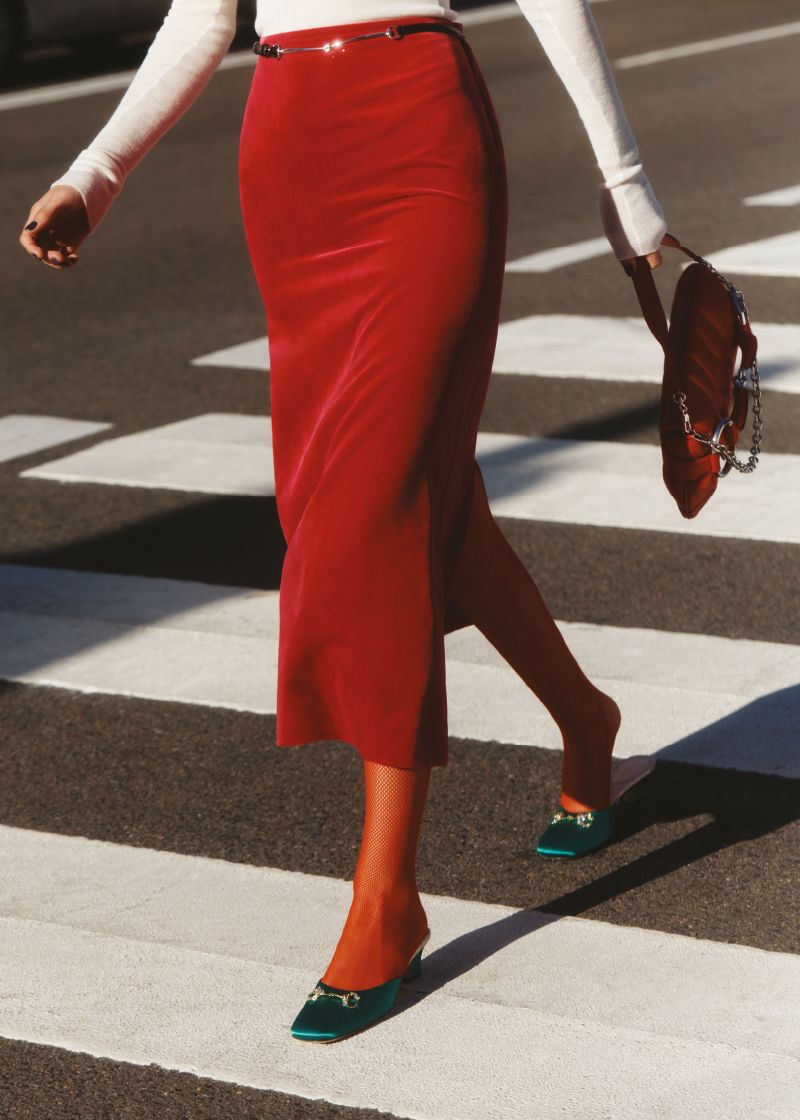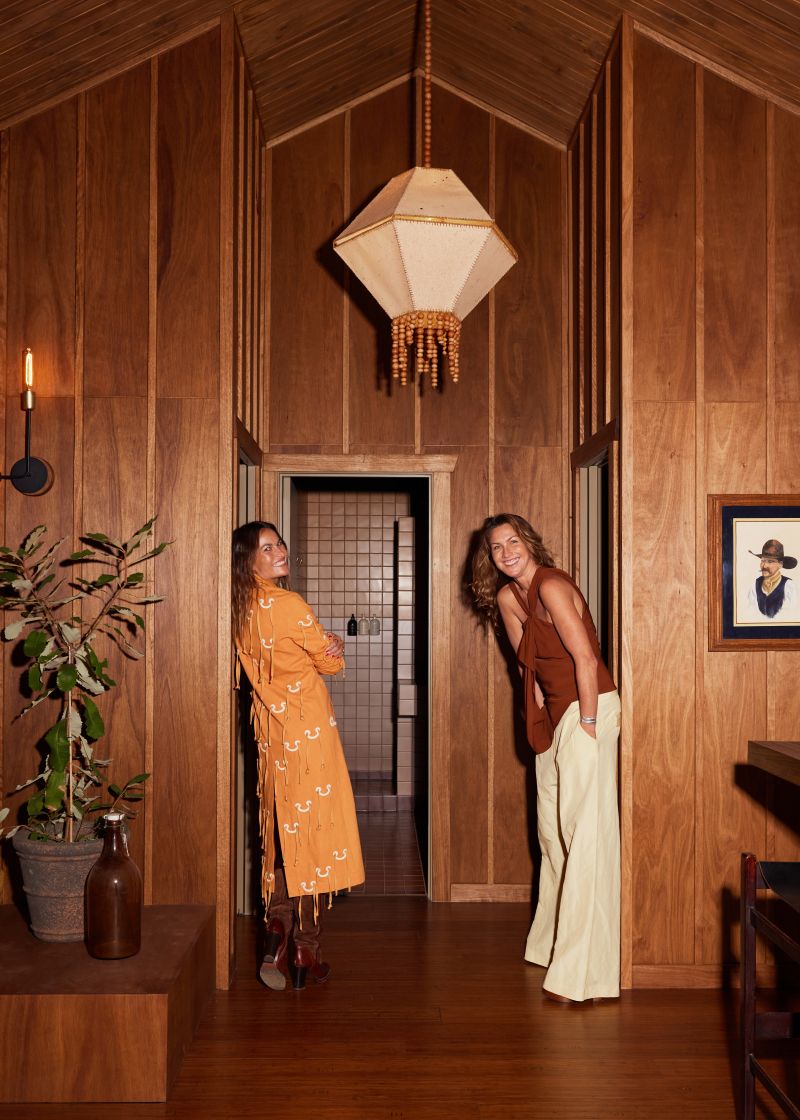
DINNER OF TRUTH
Are you as SELF-AWARE as you think? An intimate (and terrifying) new dining TREND lets you find out, so Lauren Sams sits down to supper
PHOTOGRAPHY: LAUREN BAMFORD
STYLING: POPPY BUNTZ
Before we do this, I’ll need you to sign something,” says Kate. We’ve been friends for more than 10 years, and we have never had a conversation that begins this way.
“Like an NDA?” I ask.
“More like a contract. That whatever I say cannot be used against me.”
I agree. And then Kate tells me, with my permission – actually, at my behest – all the things I do that annoy her, make her sad or upset, or generally make her eyes roll.
She tells me things she has never shared before
It’s the Dinner of Truth, and I’ve invited Kate and her true, honest-to-God opinions. We haven’t even started the meal, but I already feel as if I’m eating humble pie.
Are you self-aware? Not introspective. Not self-aware in the sense that you know your star sign (and your rising sign) or your Myers-Briggs type. Not in the Dolly magazine quiz way where you figure out your perfect Hanson brother (Taylor, obviously). More in the sense that you know yourself. You know your flaws and imperfections. Your motivations and your decision-making toolkit. Why you do the things you do. If you came with an operating manual, what would the frequently asked questions be?
The Dinner of Truth, an idea proposed by organisational psychologist Tasha Eurich, is a way to get to the truth of who you really are by asking those who know you best. Take one close friend out for a meal and ask them: what is the thing you find most annoying about me? What do I need to know about myself? What do I take for granted? What do I do that drives you insane? What could I improve about myself? How do I limit myself? Speak freely, tell me everything. Nothing is off the table.
It’s a daunting prospect. When my InStyle editor, Kathryn, offers me the assignment, I write back, without pause or spaces between the words “OHMYGODKATHRYN”. But then I take a moment. I am a 38-year-old mother of two. If I’m not game to face myself now, when will I ever be?
So I ask Kate to dinner. I choose her because she is my closest confidante. She is deeply loyal, incredibly thoughtful and the person I hope my daughters turn to for advice when they’re teenagers and they don’t want to ask me. If I were the friendship bracelet-making type, I’d make one for her.
But I’ve also seen Kate – rightly – call people on their bullshit. I’ve seen her be honest – in a fair and thoughtful way. I know she’s the right person to ask.
Before we start, I mull over my own insecurities like a bored office worker with a Japanese Zen garden. I worry that Kate will tell me I’m not a good listener. Or that she will say something about my (extremely) low tolerance for other people’s children.
Maybe she will bring up my fussy eating habits. My impatience. Sometimes I feel I’m not as thoughtful as Kate. The list of possible flaws is, quite possibly, endless.
And then, of course, I worry that one of the things Kate will bring up is this very conversation, and the awkward position I’ve put her in. I check with Kate several times before the big day – are you sure this is OK? – but she assures me it’s fine.
She is “thinking about what to say”, she says. She’s “making notes”. Oh good.
When we sit down, Kate, ever the swot, pulls out her phone, where a Notes page is filled with her musings. I can see “Dinner of Truth” at the top. She scrolls and scrolls before
she begins speaking. Oh my God. How many truths are there?
“The first thing is probably something you know,” she says. “You’re always on time. And it makes me nervous, because I think you’re going to judge me for being late.”
This is unexpected.
I want to say, “That’s not true!” but one of the rules of this exercise is that I’m not allowed to excuse or rationalise my behaviour, or go on the defensive. It’s Kate’s turn to talk. So I nod.
“OK,” I say. “Keep going.”
“OK,” says Kate. “You do so much. By the time I text you in the morning, you’ve already gone to the gym and made the kids’ breakfast and listened to a podcast and read the paper.”
“Do you feel like I judge you for that? And for the time thing?”
“No ...” she says, but I think she makes a great point: deep down, I know there is judgement there from my side. And Kate is bringing that up because she can feel it.
Having been a Type A know-it-all from an early age (birth, approximately), I get what Kate is saying. I do want to do it all. Partly that’s because I want to squeeze the most out of my days, and I dislike feeling idle. But there is something else happening here, too, that Kate has correctly tapped into: I want to present as a busy, capable person. That is important to me. But it can also manifest as judgement when other people don’t do as much as I do. That is unfair. And shitty behaviour.
We go on. There are other things – my desire for routine means I can be too rigid (completely). I quit drinking a few years ago
and Kate feels like I could loosen up once in a while (probably true). She also makes the point that I drink Diet Coke every day.
“You’d rather have Diet Coke than a negroni?” she asks, incredulously. (Again: completely. But equally: point taken.)
There are little things. Funny ones. “The way you leave my butter when we have dinner at my house ...” Kate starts. “It’s a
massacre.” She is not the first person to bring this up with me. I apologise for digging into her Lurpak like I’m Indiana Jones
searching for treasure, and promise to leave it smooth next time.
And then.
“I love you,” she says, “but I’m very glad you’re seeing someone new about your eyebrows.” (Uh, me too?) Finally, the big one.
“I know you like simplicity,” says Kate, “but sometimes I like going over the top. I think you worry that when I plan things, it becomes stressful for me. But actually, I love going all out. I know you don’t, but let me do it. I like it. It’s not a burden to me.” She points to many examples over the years: the way I try to make dinners less elaborate, the way I take the easy route when we’re on holiday together. It makes me think about the extra mile she always takes. It taps back into my initial worry about my thoughtlessness (relative to Kate’s, at any rate).
I remember the time Kate was late to the beach when we were on holiday because she wanted to buy torches for everyone to take on a night tour of the island we were staying on. The inflatables she brought along for everyone on that same trip: something I would have seen as unnecessary, but that made our holiday 100 per cent better. The plans she makes for our annual Christmas in July dinners, complete with personalised gifts, custom menus and themed costumes. The way nothing is too much trouble for her. She once drove to the next town over to buy a whisk when we were staying at a holiday house that didn’t have one, because she wanted to make a specific pancake recipe she knew we all loved. Kate doesn’t think I lack consideration or thoughtfulness; she just wants me to let her do her thing.
To me, these things are over the top. To Kate, they are love. Why would I want to get in the way of that, especially when pancakes and pool toys are involved?
In other words: let go. Don’t try to control everything. Point very, very much taken.
Chelsea Pottenger is a mindfulness and meditation coach who works primarily in the corporate leadership space. When I phone her to tell her about the Dinner of Truth, she gasps.
She’s intrigued by the idea and says that most people don’t possess anywhere near the level of self-awareness they profess to (one study by Eurich suggests that while 95 per cent of us think we’re self-aware, only 10–15 per cent actually are). For Pottenger, it’s less about knowing what other people think of us and more about evaluating whether our actions are aligned with our values.
“Self-awareness is such an important component of personal growth,” says Pottenger. “Many of us never take the time to look inwards. A lot of us would be surprised to learn that the way we show up in the world doesn’t always align with the things we hold dear. Let’s say, for example, someone tells me that family is one of their core values. But this person is working 80 hours a week and travelling constantly, so they don’t have time for their family. That is living out of step with your values.”
Self-evaluation is an ever-evolving exercise, says Pottenger. It changes as our relationships develop, as our work shifts and as we age. “These are all works in progress,” says Pottenger. “It’s good to assess where you sit every so often, to check whether your behaviour matches the things you truly find to be important.” She suggests writing down as many values as you can think of – everything from the big ones like family, health, safety and freedom to more external ideas like caring for the planet – then drill down into the five or so that you believe are the most important. “Really think about how you live your day-to-day life,” says Pottenger. “If you say you value safety but find yourself going over the speed limit often, or believe financial freedom is important but have credit card debt, then you need to do some work.” This is the real Dinner of Truth: the one you have with yourself. “When you honour your own values, you contribute to the world in a much more meaningful way,” says Pottenger.
For Kate and I, our Dinner of Truth was not so much a watershed reveal of my flaws as it was a way to connect and think about our own values and how we can improve our (already incredibly beautiful) friendship. It was affirmation that our friendship could handle some home truths and an exploration of the way we feel about each other. Kate is right: I can be controlling. I can be judgemental. I can be inflexible. Sometimes those traits are beneficial – my routine gives me structure and helps me feel tethered – but there is certainly room for improvement. I could benefit from relaxing more and letting others take the lead. There is also perhaps no need to tell everyone all the things I’ve done before 10am – simply doing the things is enough.
After Kate finishes reading her notes, we have one of the best conversations we’ve ever had. We talk about money and how we approach it. We talk about parenting and what behaviours we want to model for our daughters. We talk about our partners and our parents. And when we say goodbye, we say I love you, and that is still very much our truth.

The Story of Sarah Ellen

If The Shoe Fits
Rediscover the joys of FANCY footwear, from sandals to slingbacks, brogues and ballet flats. No prince required to find your perfect PAIR

Scent Memory
In 2023, nothing smells as good as nostalgia – whether you lived through the time you’re yearning for or not

Bronze Age
The pursuit of “I just got back from Mykonos” skin is rising like it’s 2003 again. Laura Agnew delves into the dark RETURN of tanning culture (and new ways to GET THE LOOK safely)

Ranch Life
Dubbed the Hotel of Good Times, new Byron estate Sun Ranch lives up to its moniker